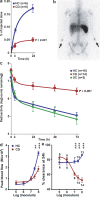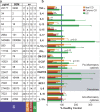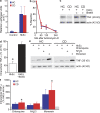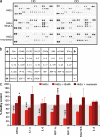Disordered macrophage cytokine secretion underlies impaired acute inflammation and bacterial clearance in Crohn's disease
- PMID: 19652016
- PMCID: PMC2737162
- DOI: 10.1084/jem.20091233
Disordered macrophage cytokine secretion underlies impaired acute inflammation and bacterial clearance in Crohn's disease
Erratum in
- J Exp Med. 2009 Sep 28;206(10):2301
Abstract
The cause of Crohn's disease (CD) remains poorly understood. Counterintuitively, these patients possess an impaired acute inflammatory response, which could result in delayed clearance of bacteria penetrating the lining of the bowel and predispose to granuloma formation and chronicity. We tested this hypothesis in human subjects by monitoring responses to killed Escherichia coli injected subcutaneously into the forearm. Accumulation of (111)In-labeled neutrophils at these sites and clearance of (32)P-labeled bacteria from them were markedly impaired in CD. Locally increased blood flow and bacterial clearance were dependent on the numbers of bacteria injected. Secretion of proinflammatory cytokines by CD macrophages was grossly impaired in response to E. coli or specific Toll-like receptor agonists. Despite normal levels and stability of cytokine messenger RNA, intracellular levels of tumor necrosis factor (TNF) were abnormally low in CD macrophages. Coupled with reduced secretion, these findings indicate accelerated intracellular breakdown. Differential transcription profiles identified disease-specific genes, notably including those encoding proteins involved in vesicle trafficking. Intracellular destruction of TNF was decreased by inhibitors of lysosomal function. Together, our findings suggest that in CD macrophages, an abnormal proportion of cytokines are routed to lysosomes and degraded rather than being released through the normal secretory pathway.
Figures





Comment in
-
The 2-phase model of Crohn's disease: from immune defect to hyperresponse.Gastroenterology. 2010 Mar;138(3):1204-6; discussion 1207. doi: 10.1053/j.gastro.2010.01.025. Epub 2010 Jan 25. Gastroenterology. 2010. PMID: 20100444 No abstract available.
References
-
- Aggarwal B.B., Kohr W.J., Hass P.E., Moffat B., Spencer S.A., Henzel W.J., Bringman T.S., Nedwin G.E., Goeddel D.V., Harkins R.N. 1985. Human tumor necrosis factor. Production, purification, and characterization.J. Biol. Chem. 260:2345–2354 - PubMed
-
- Ambrose N.S., Alexander-Williams J., Keighley M.R. 1984a. Audit of sepsis in operations for inflammatory bowel disease.Dis. Colon Rectum. 27:602–604 - PubMed
-
- Ambrose N.S., Johnson M., Burdon D.W., Keighley M.R. 1984b. Incidence of pathogenic bacteria from mesenteric lymph nodes and ileal serosa during Crohn's disease surgery.Br. J. Surg. 71:623–625 - PubMed
-
- Barrett J.C., Hansoul S., Nicolae D.L., Cho J.H., Duerr R.H., Rioux J.D., Brant S.R., Silverberg M.S., Taylor K.D., Barmada M.M., et al. ; NIDDK IBD Genetics Consortium; Belgian-French IBD Consortium; Wellcome Trust Case Control Consortium 2008. Genome-wide association defines more than 30 distinct susceptibility loci for Crohn's disease.Nat. Genet. 40:955–962 - PMC - PubMed
-
- Bazzoni F., Beutler B. 1996. The tumor necrosis factor ligand and receptor families.N. Engl. J. Med. 334:1717–1725 - PubMed
Publication types
MeSH terms
Substances
Grants and funding
LinkOut - more resources
Full Text Sources
Other Literature Sources
Medical
Molecular Biology Databases

